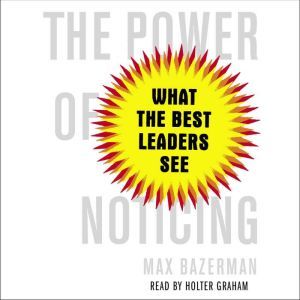

The Power of Noticing
What the Best Leaders See
Author: Max Bazerman
Narrator: Holter Graham
Unabridged: 6 hr 59 min
Format: Digital Audiobook Download
Publisher: Simon & Schuster Audio
Published: 08/05/2014
Categories: Nonfiction, Business & Economics
Synopsis
Imagine your advantage in negotiations, decision-making, and leadership if you could teach yourself to see and evaluate information that others overlook. The Power of Noticing provides the blueprint for accomplishing precisely that. Max Bazerman, an expert in the field of applied behavioral psychology, draws on three decades of research and his experience instructing Harvard Business School MBAs and corporate executives to teach you how to notice and act on information that may not be immediately obvious.
Drawing on a wealth of real-world examples and using many of the same case studies and thought experiments designed in his executive MBA classes, Bazerman challenges you to explore your cognitive blind spots, identify any salient details you are programmed to miss, and then take steps to ensure it won’t happen again. His book provides a step-by-step guide to breaking bad habits and spotting the hidden details that will change your decision-making and leadership skills for the better, teaching you to pay attention to what didn’t happen, acknowledge self-interest, invent the third choice, and realize that what you see is not all there is.
While many bestselling business books have explained how susceptible to manipulation our irrational cognitive blind spots make us, Bazerman helps you avoid the habits that lead to poor decisions and ineffective leadership in the first place. With The Power of Noticing at your side, you can learn how to notice what others miss, make wiser decisions, and lead more successfully.

